

Philosophy, Religion and the History of Science, School of. Philosophy, Religion and the History of Science, School of Key measures: Positive Outcomes: 94.7%, Graduate prospects: 72.3%, Graduate employment: 67.7% Graduate destinations: Work Full-time: 51%, Work Part-time: 15%, Work & Study: 8%, Further study: 22%, Unemployed: 4% Top industry sectors: Event Management, Leisure, Hospitality & Tourism; Buying, Selling & Retail; Advertising, Marketing & Public Relations; Administration; Education Salary levels: Under £10,000: 24%, £10,000-£19,999: 46%, £20,000-£29,999: 26%, £30,000-£39,999: 2%, Over £40,000: 2% The Leeds Network We have an extensive network of alumni with a wide range of experiences, doing all kinds of jobs.
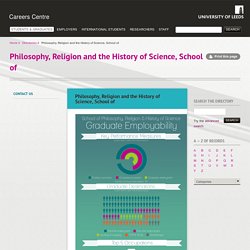
Websites and downloadable resources. Downloads. Philosophy degree career options. Philosophy students tend to have an inquisitive nature, and are willing to question just about anything and everything.
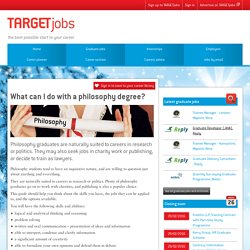
They are naturally suited to careers in research or politics. What can I do with a philosophy degree? Philosophy teaches you how to think for yourself and how to analyse and communicate ideas in an understandable, balanced and well thought-out manner.
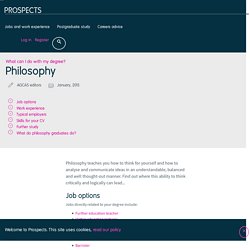
Find out where this ability to think critically and logically can lead... Job options Jobs directly related to your degree include: Jobs where your degree would be useful include: Remember that many employers accept applications from graduates with any degree subject, so don't restrict your thinking to the jobs listed here. Work experience Undertaking some short-term paid or voluntary work will enhance your prospects of finding suitable long-term employment and could give you valuable insight into how a company or institution operates. Entry-level work in very competitive areas such as media, PR and publishing is a good way of 'getting a foot in the door' and may lead to rewarding long-term work. What can I do with a philosophy degree? Skills Your head might be crammed full of useful (and some not-so-useful) information, but your philosophy degree will also help you to develop a wealth of useful skills… Analytical Skills You’re better than Shearer and Hansen put together.
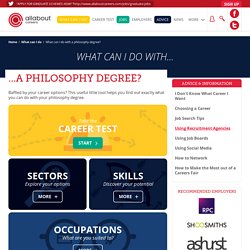
You’re even better than Gary Neville. Fortunately, your top-notch analytical skills also extend beyond the world of football punditry. Attention to Detail You can spot a needle in a haystack. Communication (Oral) All mouth, no trousers? Communication (Written) You may not be a romantic poet, but you can write in a professional, succinct and appealing fashion. Creativity You have the ability to come up with creative and innovative ideas. Critical Thinking When you’re presented with a problem or idea, you have the ability to think about it from a critical perspective.
Decision Making. British Philosophical Association – representing professional philosophers in the UK. Philosophy degrees and employability Many prospective students of philosophy, and even more so their parents, are sometimes concerned about the job prospects of philosophy graduates.

It is true that ’first destination’ figures, which are collected three months after graduation, often show philosophy graduates towards the bottom of the table. However one reason for this is that many philosophy graduates have rejected the idea of a conventional path through life, and so seek more unusual forms of work, and so take their time to find the right opportunity. Figures are not available for career destinations ten years after graduation but on anecdotal evidence there is reason to think that philosophy graduates are at least as likely to have found satisfying employment as those who have graduated in other disciplines, perhaps rather more so. PRS Employability Guide Guardian Education article Click here for a Guardian Education article (20.11.07) about the employability of Philosophy graduates. Emp guide for web. Philosophy-careers-guide. What can I do with a theology and religious studies degree?
Studying theology and religious studies allows you to explore how religious beliefs and practices shape and influence the world we live in Job options Jobs directly related to your degree include: Jobs where your degree would be useful include: Remember that many employers accept applications from graduates with any degree subject, so don't restrict your thinking to the jobs listed here.
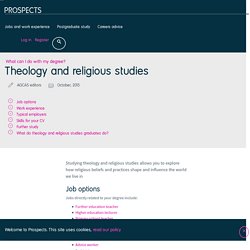
Work experience It's important to get relevant work experience to boost your employability prospects. Talk to professionals in the field you're interested in and consider work placements, paid evening and weekend work, voluntary work or work shadowing. If you are thinking about work in religious ministry, talk to local spiritual leaders and get involved in the life of your religious community to find out more about what's involved. Search for placements and find out more about work experience and internships. Typical employers Skills for your CV. What can I do with a theology degree? Skills Your head might be crammed full of useful information, but your theology degree will also help you to develop a wealth of valuable skills… Analytical Skills You’re better than Shearer and Hansen put together.

You’re even better than Gary Neville. Fortunately, your top-notch analytical skills also extend beyond the world of football punditry. Attention to Detail You can spot a needle in a haystack. Communication (Oral) All mouth, no trousers? Communication (Written) You may not be a romantic poet, but you can write in a professional, succinct and appealing fashion. Critical Thinking.